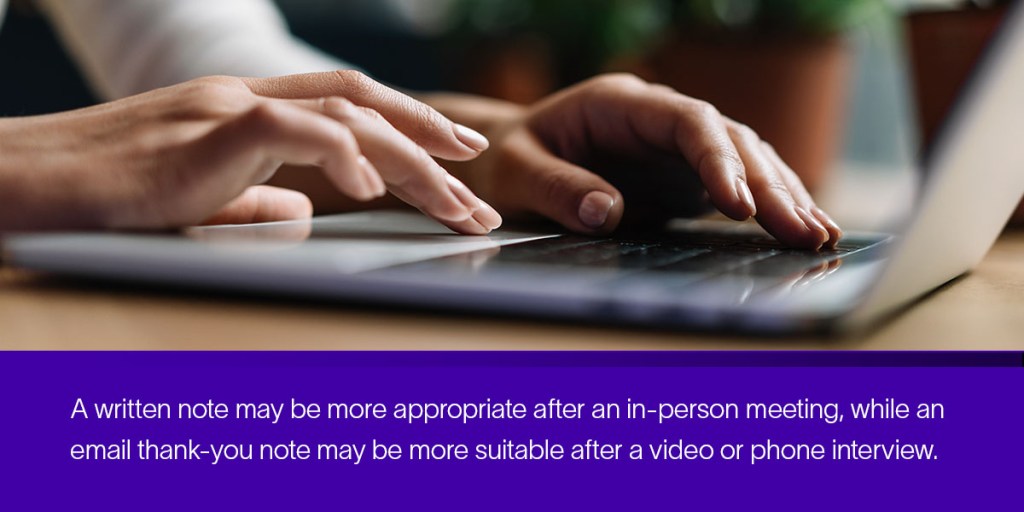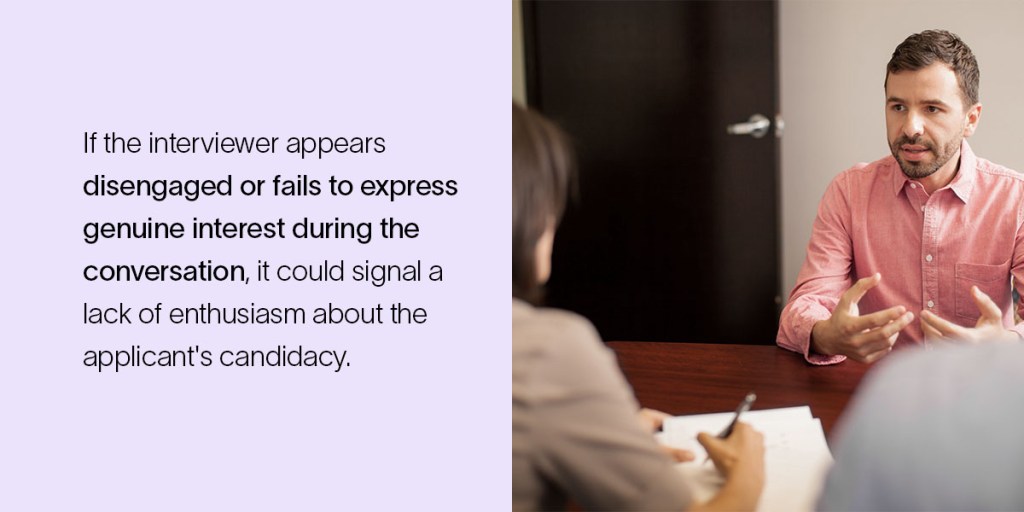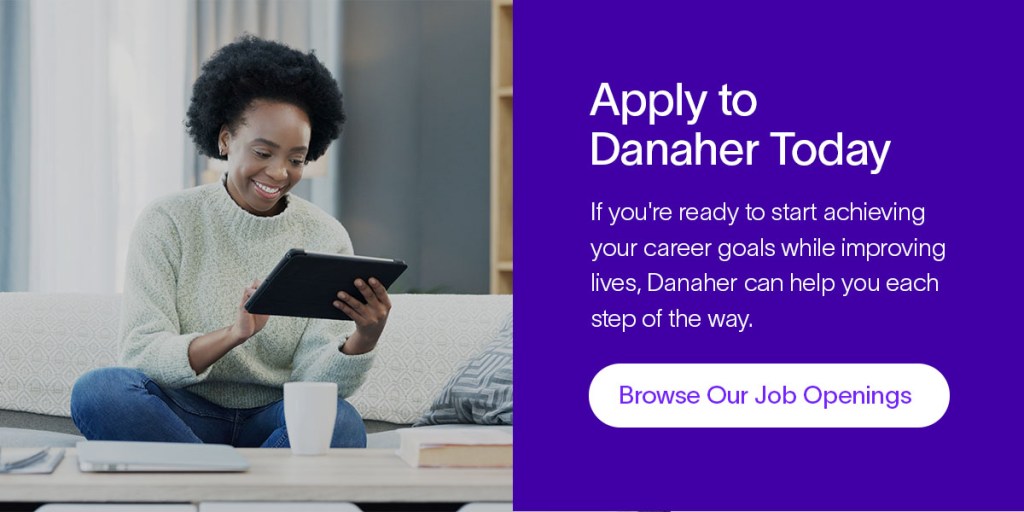In the fast-paced world of job hunting, interviews remain essential. We’ve all heard the best practices for a job interview — dressing professionally, maintaining eye contact, practicing answers, researching the company, and so on. But what happens after the interview? We’ve created this list of essential post-interview tips to help job candidates leave a lasting impression on employers and hiring managers.
Table of Contents

Why the Post-Interview Process Matters
The post-interview process offers an opportunity to reinforce professionalism, demonstrate enthusiasm and stand out from other candidates. It allows applicants to leave a lasting impression on potential employers, proving their interest in the role and the company.
Additionally, following up after an interview can provide valuable insights into the hiring timeline and decision-making process, helping candidates stay informed and engaged throughout the job search journey.
Those few days following a job allow individuals to take the time to:
- Highlight key takeaways from the interview.
- Reiterate interest in the company and role.
- Thank the interviewer for their time.
- Determine the next steps and prepare accordingly.
- Note tips to improve performance in future interviews.
9 Things to Do After a Job Interview
Spending time reflecting on interview performance, writing a thank-you note, looking up the interviewer on LinkedIn and noting important things about the job and company can help candidates make a lasting impression and solidify themselves as upstanding candidates. Below, we’ll cover what to do after an interview and constructive steps for applicants.
1. Ask About the Next Steps
A candidate should gauge what the next steps will look like. They can ask the interviewer about the following details:
- The expected waiting period for decision-making
- Whether there will be a second interview
- How candidates will be notified moving forward
- Whether they can provide the employer with any other information or work samples in the meantime
2. Exchange Contact Information
Exchanging phone numbers or email addresses allows interviewees to get ahold of the hiring manager if needed. For instance, if a candidate doesn’t hear from the employer within the specified time window, they might consider reaching out and politely inquiring about the status of the interviewer’s decision.
The employer also needs the candidate’s contact information so they can reach out once they’ve made a decision. Exchanging contact information serves as a fundamental post-interview step.
3. Assess Interview Performance
Following the interview, a candidate should jot down their answers to any questions they remember. They can review their responses and how confident they feel about them. Additionally, candidates can reflect on questions or topics they wish the interviewer would have asked.
Evaluating performance helps the candidate note strong answers for future interviews and identify areas for improvement. It also helps reveal untapped talking points.
4. Consider Feelings About the Company and Job
After the interview, the candidate should consider their overall perception of the company and job. Have their feelings changed since they first applied? These reflection questions would be beneficial to think about after an interview:
- Does this position seem like a good fit for me?
- Does the company seem to foster a positive environment and culture? Can I see myself fitting in?
- Can I fulfill the expectations of this role?
- Does this job align with my career goals?
- Will I be able to manage the hours and scheduling requirements?
- Does the company offer the compensation and benefits I am looking for?
- Have I identified opportunities to grow?
- If I were to get an offer, would I take it?
5. Make Notes of Things to Remember
In addition to writing down answers to questions and discussion points for future interviews, interviewees can note other things worth remembering about the company. Some examples include:
- The names of people involved in the interview.
- General information about the company, such as history, products or services.
- Observations about the office environment.
- Information about the position of interest, like day-to-day responsibilities, expectations, hours and dress code.
6. Send a Thank-You Note

Writing a thank-you note or email after the interview expresses a candidate’s gratitude for the interviewer’s time and willingness to speak with them. Thank-you notes allow applicants to reaffirm their interest in the company and position, whether handwritten or sent electronically.
A written note may be more appropriate after an in-person meeting, while an email thank-you note may be more suitable after a video or phone interview. Interviewers will also receive an emailed message more quickly. Timely receipt should be a vital consideration if there’s a limited timeframe for the hiring decision.
However, a formal handwritten card might be more acceptable in some industries. If a candidate has any connections in a similar industry, they might consider asking that connection for advice. Whether a written or typed-out message, proofread the letter carefully to ensure it’s free of typos and grammatical errors.
7. Connect on Social Media
After the interview, connect with the interviewer on different social networking platforms, such as LinkedIn. An interviewer accepting the request could indicate their interest in learning more about a candidate. Additionally, applicants with extensive professional networks can learn about job opportunities faster than their counterparts who solely use job portals during their search.
Connecting on LinkedIn can help an interviewee sell themselves to the employer. Recruiters and hiring managers can learn more about the candidate’s experiences and achievements by viewing their LinkedIn profile. The candidate should regularly share posts, engage in discussions and update their profile information to build and reinforce their personal brand.
Employers will more likely remember a candidate with a unique brand and accomplishments. As a result, the interviewer may be more inclined to consider that candidate for the role. In fact, a job applicant with a comprehensive LinkedIn profile is 71% more likely to get an interview.
Even if an interviewee ends up in a different role and organization, connecting with the employer on social media still serves as a valuable part of the post-interview timeframe. It helps the candidate grow their personal network and keep an eye out for future opportunities.
8. Send Any Supporting Documents
If the employer, recruiter or hiring manager requests any additional supporting documents, be sure to send them after the interview. For example, the interviewer may ask an applicant to provide the following resources:
- A page of references
- Consent forms to conduct various checks for pre-screening purposes
- A written assessment or questionnaire
Try to organize and submit these documents as soon as possible. Like always, ensure up-to-date, grammatically correct and typo-free text.
9. Contact References
If a candidate included references in their application, they should inform these references that a company representative may contact them after the interview.
Ideally, the candidate would have asked these individuals about using them as references before applying for the position. Even so, it’s a common and courteous practice to inform the references that they may receive a phone call. That way, they know to expect it.
7 Signs Candidates Will Get the Job After an Interview
The following signs suggest an applicant might have landed the job.
1. The Conversation Turned Casual
Interviews focus solely on work matters, with interviewers usually following a standard set of questions to quickly evaluate applicants. However, a shift to more relaxed conversation may be a good sign. This transition could indicate satisfaction with an applicant’s qualifications and an interest in getting to know them personally.
2. Introduction to Other Team Members
Introducing an applicant to other team members indicates the interviewer views the applicant as a potential cultural fit and wants to see how they’ll integrate into the team dynamic.
3. Discussion of Follow-Up Processes
If the interviewer initiates a discussion about the next steps in the hiring process, the interview likely went well. This proactive approach suggests they envision an applicant as a potential candidate and have begun planning the subsequent stages.
4. Exchange of Contact Information
When the interviewer gives applicants their card with their phone number unprompted, they feel interested in maintaining communication. This gesture signifies an openness to further communication and suggests they view the candidate as a serious contender for the position.
5. Inquiry About Transition Steps
A promising sign occurs when the interviewer asks about an applicant’s availability and readiness for the transition. They are already considering the applicant as a potential addition to the team and planning for potential onboarding.
6. Offer of a Tour
Just like meeting the team, if the interviewer suggests showing an applicant around the building, it indicates that the interview went well. A tour of the building or office often means the interviewer wants to persuade the applicant to take the job.
7. Contacting References
Reaching out to an applicant’s references following the interview is a strong signal of serious consideration because it suggests the interviewer is conducting due diligence and actively evaluating the candidate’s suitability for the role.
Note that these signs, while not definitive, often point toward a positive outcome. Keep them in mind and maintain optimism throughout the process.
7 Signs Candidates Didn’t Get the Job After the Interview
These signs could indicate that the outcome might not be in a candidate’s favor.

1. Lack of Interest From the Interviewer
If the interviewer appears disengaged or fails to express genuine interest during the conversation, it could signal a lack of enthusiasm about the applicant’s candidacy. Applicants may notice disinterest if the interviewer shows closed-off body language or constantly checks the time. Other forms of disinterest can manifest as a lack of inquiries or details regarding the next steps in the process.
2. Brief Interview Duration
A shorter-than-expected interview may indicate that the interviewer has already made a decision, prompting them to conclude the conversation early.
3. Absence of Position Selling
Once an interviewer assesses an applicant’s skills and qualifications, they often shift the focus to promoting the company and the job opportunity. If the interviewer doesn’t provide detailed information about the role or fails to highlight its positive aspects, it suggests they may not see an applicant as a suitable candidate.
4. Mismatched Compensation Expectations
During an interview, one of the most frequently asked questions involves salary expectations. A disconnect between an applicant’s salary expectations and the company’s offer could indicate they want to find candidates who better align with their budget.
5. Active Job Listing
If the job posting remains active after the interview, it may be because the company is still looking for suitable candidates.
6. Lack of Response to Follow-Ups
If applicants don’t receive any response to their follow-up inquiries or thank-you notes, it may suggest the company has moved forward with other candidates.
7. Mention of Overqualification
If the interviewer raises concerns about an applicant’s overqualification for the position, it could indicate that they perceive an applicant as too experienced or skilled for the role. This potentially leads them to consider other candidates.
Remember, while these signs are good to keep in mind, they do not guarantee that a company has moved on with its search.
Post-Interview FAQ
Job seekers often wonder about the next steps after an interview, especially if they suspect they didn’t secure the position. Consider the answers to the following common questions.

Apply to Danaher Today
If you’re ready to start achieving your career goals while improving lives, Danaher can help you each step of the way. Our team has developed innovative solutions in diagnostics, water quality, product identification and other areas.
We want to see others thrive in these fields and make a difference in the world, so we offer a plethora of opportunities to grow your skills and revolutionize the world of science and medicine. Browse our job openings and start applying today!

Comments
One response to “What to Do After the Interview”
[…] have used professional networking platforms to schedule interviews with job seekers. In fact, about 71% of candidates who completed their LinkedIn profile were more likely to get an interview. However, LinkedIn is […]